-
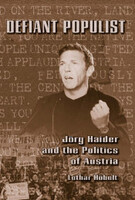
Publisher's description:
Whether or not Haider has followed the ideological path of his compatriot Adolf Hitler, says Austrian political historian Höbelt, he has certainly followed his route to publicity around the world. He explores the politics of modern Austria, and debunks the myth that Haider is driven by passion rather than self-interest.
-

Publisher's description:
A no-holds-barred biography of Hungarian Prime Minister Viktor Orbán, who has become a pivotal figure in European politics since 2010, this is the first English- language study of the erstwhile anti-communist rebel turned populist autocrat. Through a masterly and cynical manipulation of ethnic nationalism, generating fear of migrants and deep-rooted corruption, Orbán has exploited successive electoral victories to build a closely knit and super-rich oligarchy. He holds unfettered power in Hungary and is regarded as the single most powerful leader within the European Union. Orbán's ambitions are far-reaching. Hailed by governments and far-right politicians as a symbol of a new anti-Brussels nationalism, his ruthless crackdown on refugees, his open break with normative values and his undisguised admiration for Presidents Putin and Trump mean he poses a formidable challenge to Angela Merkel and the survival of liberal democracy in a divided Europe. Drawing on access to exclusive documents and numerous interviews, celebrated veteran journalist Paul Lendvai paints a compelling portrait of the most successful and, arguably, most dangerous politician in Hungarian history.
-

Publisher's description:
This book is about one of the most remarkable European politicians of recent decades, Silvio Berlusconi, and about his contribution to the dramatic changes that have overtaken Italian politics since the early 1990s. From the vantage point of 2017, would Italian political history of the past twenty-five years look substantially different had Berlusconi not had the high-profile role in it that he did? Asking the question makes it possible to contribute to a broader debate of recent years concerning the significance of leaders in post-Cold War democratic politics. Having considered Berlusconi's legacy in the areas of political culture, voting and party politics, public policy and the quality of Italian democracy, the book concludes by considering the international significance of the Berlusconi phenomenon in relation to the recent election of Donald Trump, with whom Berlusconi is often compared.
-
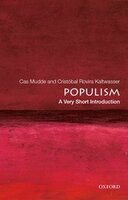
Publisher's description:
Populism is a central concept in the current media debates about politics and elections. However, like most political buzzwords, the term often floats from one meaning to another, and both social scientists and journalists use it to denote diverse phenomena. What is populism really? Who are the populist leaders? And what is the relationship between populism and democracy? This book answers these questions in a simple and persuasive way, offering a swift guide to populism in theory and practice. Cas Mudde and Cristóbal Rovera Kaltwasser present populism as an ideology that divides society into two antagonistic camps, the "pure people" versus the "corrupt elite," and that privileges the general will of the people above all else. They illustrate the practical power of this ideology through a survey of representative populist movements of the modern era: European right-wing parties, left-wing presidents in Latin America, and the Tea Party movement in the United States. The authors delve into the ambivalent personalities of charismatic populist leaders such as Juan Domingo Péron, H. Ross Perot, Jean-Marie le Pen, Silvio Berlusconi, and Hugo Chávez. If the strong male leader embodies the mainstream form of populism, many resolute women, such as Eva Péron, Pauline Hanson, and Sarah Palin, have also succeeded in building a populist status, often by exploiting gendered notions of society. Although populism is ultimately part of democracy, populist movements constitute an increasing challenge to democratic politics. Comparing political trends across different countries, this compelling book debates what the long-term consequences of this challenge could be, as it turns the spotlight on the bewildering effect of populism on today's political and social life.
-
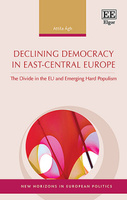
Publisher's description:
The dramatic decline of democracy in East-Central Europe (ECE) has attracted worldwide attention, presenting a significant challenge to European models of liberal democracy. This timely book tackles the heart of this region's complexity, unpacking the socio-economic, political and cultural developments of the ECE countries. Attila Ágh demonstrates the key turning point in 2010, when the region's political trajectory shifted from chaotic democracy to authoritarian rule. Moving beyond the narrow spectrum of political 'event history' deployed by ECE parties and governments, the author offers a complex analysis of the changes to the region, exploring the deep, systemic causes of hard populism. Examining the fascinating relationship between ECE countries, Europe and the world, Ágh outlines the future of democracy in the region, exploring perspectives of re-democratization by the new generation raised under the auspices of EU democracy. Declining Democracy in East-Central Europe provides researchers in both political and European studies with a unique insight into the rapidly diverging pathways of European democracies. Ágh's detailed approach to the ECE region will also benefit experts in regional studies, moving beyond political narratives of individual countries and analysing the region as a whole/
-
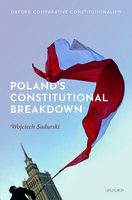
Publisher's description:
Since 2015, Poland's populist Law and Justice Party (PiS) has been dismantling the major checks and balances of the Polish state and subordinating the courts, the civil service, and the media to the will of the executive. Political rights have been radically restricted, and the Party has captured the entire state apparatus. The speed and depth of these antidemocratic movements took many observers by surprise: until now, Poland was widely regarded as an example of a successful transitional democracy. Poland's anti-constitutional breakdown poses three questions that this book sets out to answer: What, exactly, has happened since 2015? Why did it happen? And what are the prospects for a return to liberal democracy? These answers are formulated against a backdrop of current worldwide trends towards populism, authoritarianism, and what is sometimes called 'illiberal democracy'. As this book argues, the Polish variant of 'illiberal democracy' is an oxymoron. By undermining the separation of powers, the PiS concentrates all power in its own hands, rendering any democratic accountability illusory. There is, however, no inevitability in these anti-democratic trends: this book considers a number of possible remedies and sources of hope, including intervention by the European Union.
-
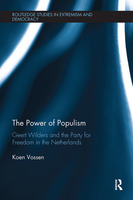
Publisher's description:
This book discusses the Party for Freedom (PVV), a political party in the Netherlands, founded and led by Geert Wilders. Attaining between 10 and 18% of the votes, the PVV has become one of the largest parties in the Netherlands and is the only political party worldwide without members. Between 2010 and 2012 the party supported a minority coalition of liberals and Christian-democrats in exchange for influence on governmental policy. The PVV can be viewed as the Dutch version of an ideological family of nationalist parties linked by their opposition to immigration and to the political and cultural elites. Within this family, Geert Wilders has played an important role as pioneer of a new master frame, in which Islam is portrayed as the historical arch-enemy of the West. As the main figurehead of European islamophobia, Wilders has inspired political parties and organizations in Europe, North-America, Israel and even Australia.
-

Publisher's description:
What explains the dramatic rise of the extreme, ultranationalist Golden Dawn in a country that has experienced Nazi invasion and a military dictatorship? This book places the rise of the Golden Dawn in the context of the Eurozone crisis and argues that its rise is not merely the product of economic malaise. Rather, the success of the Golden Dawn is dependent on the extent to which it was able to propound plausible solutions to the three sets of crises - economic, political and ideological - that culminated in an overall crisis of democracy in Greece. The authors argue that much of the party's success can be attributed to its strategic choice to tap into the widespread disillusionment of the Greek people by offering them a 'nationalist solution': a rhetoric that emphasizes the twin fascist myths of social decadence and national rebirth.
-
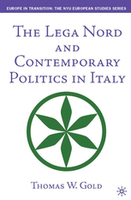
Publisher's description:
The 'Lega Nord' is one of the most important right-wing populist parties to emerge in Western Europe during the past two decades. It continues to play a very significant role in Italian politics. The author links the Lega Nord's rise to the socioeconomic development of the north over the south in Italy and the political process which created a voting block in the south. This led the north of Italy to see 'Rome' as a predatory entity, drawing resources and impeding progress in the north to support the south. The author examines this process and explores the implications it produces for the whole of Europe.
-

Publisher's description:
The extreme right-wing National Front is now France's fourth largest political party. In 1986 under a proportional electoral system it won thirty-five seats in the French National Assembly; in the 1988 Presidential election the National Front's leader, Jean-Marie Le Pen, obtained over fourteen percent of the popular vote. Over the past decade, it has won representation at virtually all levels of French politics.
Le Pen's xenophobic anti-immigrant message has clearly attracted significant support in France. He has had a major influence upon the terms on which issues like immigration, nationality and racism are debated in France. Drawing on personal interviews with Le Pen and other National Front leaders, Jonathan Marcus traces the rise of Le Pen's party, and its impact on the French political scene, and in the process raises important questions about the future of French, European, and world politics. How far have the mainstream parties of both Left and Right faced up to Le Pen's challenge? Is the National Front now a permanent feature of French politics? To what degree is Le Pen a threat to French democracy? And finally, how successful will Le Pen be in pushing his agenda in the European Parliament?
-

Publisher's description:
For more than two decades Islamic veils, niqabs, burkinis, have been the object of intense public scrutiny and legal regulations in many Western countries, especially in Europe, and feminists have been actively engaged on both sides of the debates: defending ardently strict prohibitions to ensure Muslim women's emancipation, or, by contrast, promoting accommodation in the name of women's religious agency and a more inclusive feminist movement. These recent developments have unfolded in a context of rising right-wing populism in Europe and have fueled "femonationalism", i.e. the instrumentalization of women's rights for xenophobic agendas. This book proposes to explore this contemporary troubled context for feminism, its current divisions and its future. It investigates how these changes have transformed contemporary feminist movements, intersectionality politics, and the feminist collective subject, and how feminists have been enrolled in the femonationalist project or, conversely, have resisted it in two contexts: France and Québec. It provides new empirical data on contemporary feminist activists, as well as a critical normative argument about the subject and future of feminism. It makes a contribution to intersectionality theory by reflecting on the dynamics of convergence and difference between race and religion. At the normative level, the book provides an original addition to vivid debates in feminist political theory and philosophy on the subject of feminism. It argues that feminism is better understood not as centered around an identity -women -, but around what it calls a feminist ethic of responsibility, which foregrounds a pragmatist moral approach to the feminist project.
-
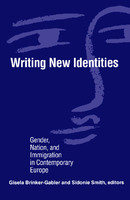
Publisher's description:
At the end of the twentieth century the peoples of the New Europe are confronting changing notions of community, renegotiating borders and territory, imagining new markets and identities, and responding, sometimes violently, to the increasing cultural diversity that comes with large numbers of immigrants and migrant workers. The essays in Writing New Identities address the complexities of this moment of crisis and explore the interrelationships of nationalisms, genders, and representational practices from a variety of theoretical and critical perspectives.
As they take up diverse cultural texts-personal narrative, film, essay, magazines, poetry, fiction—produced across the breadth of Europe, from Ireland to Russia, from Sweden to Italy—these essays provocatively engage the following questions: How are women writing themselves into and out of the stories nations tell about themselves? How do multicultural subjects, with their diverse histories and subjectivities, enter those same stories? What impact might new forms of subjectivity have on the construction and deconstruction of national identities in the New Europe?
Writing New Identities is the first volume to address the strategies through which those who have all too often been left out of the story—women and members of ethnic minorities—negotiate the national cultures and traditions of the old Western European nation-states. In addition, the contributors assess the ways in which cultural production in the nation-states of Eastern Europe participates in radically altering national and cultural politics.
-
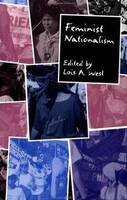
Publisher's description:
Feminist Nationalism demonstrates how feminism is redefining nationalism by presenting case studies from Europe, the Middle East, Africa, Asia and the Americas. Consisting of social movements and cultural ideologies, feminist nationalism links struggles for women's rights with struggles for group identity rights and/or national sovereignty in their goals of self-determination. Many analyses of nationalism assume it is identical for women and men in its definition and operation. This collection challenges that framework by placing women at the center and demonstrating how feminism is redefining nationalism both in particular cases and in the global context.
-
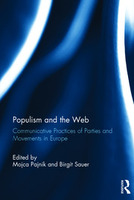
Publisher's description:
The Web plays an increasingly important role in the communication strategies of political parties and movements, which increasingly utilize it for promoting ideas and ideologies as well as mobilization and campaigning strategies.
This book explores the role of the Web for right-wing populist political parties and movements across Europe. Analyzing these groups’ discourses and practices of online communication, it shows how social media is used to spread ideas and mobilize supporters whilst also excluding constructed ‘others’ such as migrants, Muslims, women or LGBT persons. Expert contributors provide evidence of a shift in the strategies of mainstream parties as they also engage in ‘Internet populism’ and suggest ways that progressive movements can and do respond to counter these developments. Topics are explored using a cross-country analysis which does not neglect the particularities of the national contexts.
This work will appeal to researchers and students working in the fields of media and communication studies, political theory, policy analysis, studies of populism, racism and nationalism, gender, LGBT, migration, Islam and welfare.
-
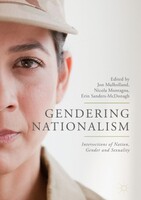
Publisher's description:
This volume offers an empirically rich, theoretically informed study of the shifting intersections of nation/alism, gender and sexuality. Challenging a scholarly legacy that has overly focused on the masculinist character of nationalism, it pays particular attention to the people and issues less commonly considered in the context of nationalist projects, namely women and sexual minorities. Bringing together both established and emerging researchers from across the globe, this multidisciplinary and comparison-rich volume provides a multi-sited exploration of the shifting contours of belonging and Otherness generated by multifarious nationalisms. The diverse, and context specific positionings of men and women, masculinities and femininities, and hegemonic and non-normative sexualities, vis-à-vis nation/alism, are illuminated through a vibrant array of contemporary theoretical lenses. These include historical and feminist institutionalism, post-colonial theory, critical race approaches, transnational and migration theory and semiotics.
-

Publisher's description:
Sara R. Farris examines the demands for women's rights from an unlikely collection of right-wing nationalist political parties, neoliberals, and some feminist theorists and policy makers. Focusing on contemporary France, Italy, and the Netherlands, Farris labels this exploitation and co-optation of feminist themes by anti-Islam and xenophobic campaigns as “femonationalism.” She shows that by characterizing Muslim males as dangerous to western societies and as oppressors of women, and by emphasizing the need to rescue Muslim and migrant women, these groups use gender equality to justify their racist rhetoric and policies. This practice also serves an economic function. Farris analyzes how neoliberal civic integration policies and feminist groups funnel Muslim and non-western migrant women into the segregating domestic and caregiving industries, all the while claiming to promote their emancipation. In the Name of Women's Rights documents the links between racism, feminism, and the ways in which non-western women are instrumentalized for a variety of political and economic purposes.
-

Publisher's description:
This handbook aims to challenge ‘gender blindness’ in the historical study of high politics, power, authority and government, by bringing together a group of scholars at the forefront of current historical research into the relationship between masculinity and political power. Until very recently in historical terms, formal political authority in Europe was normally and ideally held by adult males, with female power being perceived as a recurrent aberration. Yet paradoxically the study of the interactions between masculinity and political culture is still very much in its infancy. This volume seeks to remedy this lacuna by considering the different consequences of the masculinity of power over two millennia of European history. It examines how masculinity and political culture have interacted from ancient Rome and the early medieval Byzantine empire, to twentieth-century Germany and Italy. It considers a broad variety of case studies from early medieval Iceland and late medieval France, to Naples at the time of the French Revolution and Strasbourg after the Franco-Prussian War, with a particular focus on the development of political masculinities in Great Britain between the sixteenth century and the present day.
-
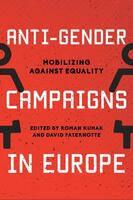
After decades of steady progress in terms of gender and sexual rights, several parts of Europe are facing new waves of resistance to a so-called 'gender ideology' or 'gender theory'. Opposition to progressive gender equality is manifested in challenges to marriage equality, abortion, reproductive technologies, gender mainstreaming, sex education, sexual liberalism, transgender rights, antidiscrimination policies and even to the notion of gender itself. This book examines how an academic concept of gender, when translated by religious organizations such as the Roman Catholic Church, can become a mobilizing tool for, and the target of, social movements. How can we explain religious discourses about sex difference turning intro massive street demonstrations? How do forms of organization and protest travel across borders? Who are the actors behind these movements? This collection is a transnational and comparative attempt to better understand anti-gender mobilizations in Europe. It focuses on national manifestations in eleven European countries, including Russia, from massive street protests to forms of resistance such as email bombarding and street vigils. It examines the intersection of religious politics with rising populism and nationalistic anxieties in contemporary Europe.
-

Publisher's description:
This book is a systematic consideration of the link between the extreme right and the discourse about developments in regard to gender issues within different national states. The contributors analyze right-wing extremist tendencies in Europe under the specific perspective on gender. The volume brings together the few existing findings concerning the quantitative dimension of activities carried out by men and women in different countries, and illuminates and juxtaposes gender ratios along with the role of women in right-wing extremism. Along with the gender-specific access to right-wing groups, the chapters look at networks, organizational forms, specific strategies of female right-wing extremists, their ideologies (especially regarding femininity and masculinity), hetero normativity, discourses on sexuality, and preventive and counter-strategies. The book will be of use to students and scholars interested in gender and politics, European politics, and political extremism.
-

Publisher's description:
The populist radical right is one of the most studied political phenomena in the social sciences, counting hundreds of books and thousands of articles. This is the first reader to bring together the most seminal articles and book chapters on the contemporary populist radical right in western democracies. It has a broad regional and topical focus and includes work that has made an original theoretical contribution to the field, which make them less time-specific.
-

Publisher's description:
While research in right-wing populism has recently been blossoming, a systematic study of the intersection of right-wing populism and gender is still missing, even though gender issues are ubiquitous in discourses of the radical right ranging from »ethnosexism« against immigrants, to »anti-genderism.«
This volume shows that the intersectionality of gender, race and class is constitutional for radical right discourse. From different European perspectives, the contributions investigate the ways in which gender is used as a meta-language, strategic tool and »affective bridge« for ordering and hierarchizing political objectives in the discourse of the diverse actors of the »right-wing complex.«
-

-
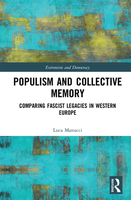
Publisher's description:
Right-wing populism is a global phenomenon that challenges several pillars of liberal democracy, and it is often described as a dangerous political ideology because it resonates with the fascist idea of power in terms of anti-pluralism and lack of minorities’ protection. In Western Europe, many political actors are exploiting the fears and insecurities linked to globalization, economic crisis, and mass migrations to attract voters. However, while right-wing populist discourses are mainstream in certain countries, they are almost completely taboo in others. Why is right-wing populism so successful in Italy, Austria, and France while in Germany it is marginal and socially unacceptable? It is because each country developed a certain collective memory of the fascist past, which stigmatizes that past to different levels. For this reason, right-wing populism can find favorable conditions to thrive in certain countries, while in others it is considered as an illegitimate and dangerous idea of power. Through a comparative study of eight European countries, this book shows that short-term factors linked to levels of corruption, economic situation, and quality of democracy interact with long-term cultural elements and collective memories in determining the social acceptability of right-wing populist discourses.
-
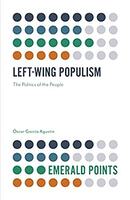
Publisher's description:
In the aftermath of the economic crisis, left-wing parties and leaders began to consider themselves populists or were labelled as such in media and public discourse. This trend can be witnessed in instances such as Syriza in Greece, Podemos in Spain, France Insoumise in France, DiEM25 at the European level and even Corbyinism in the UK. However, the problem still remains as to how we define left-wing populism in contemporary Europe as well as the main characteristics.
This book conceptualizes left-wing populism as a combination of the populist impetus of expanding representation, through the appeal to "the people" against "the elites" and the agenda of the left to promote equality and social justice. This study undertakes an in-depth exploration into the concepts of sovereignty, class identity and "the people".
Moreover, this book also discusses the institutional dimension of left-wing populism, in dialogue with republicanism and the international sphere, reflected in the debate between sovereignism and transnationalism. The result is an open conceptualization of left-wing populism in which populist parties acquire a hybrid form and incorporate different traditions and influences such as socialism, populism and republicanism in order to reach a social majority and expand democracy. This recent phenomenon of left-wing populism has showed potential to re-define the left-project, but also demonstrates its shortcomings regarding the scope of the political change and its capacity to make politics in a different manner, by and for the people. This invaluable text will prove an essential read for those in the fields of political theory and contemporary political studies.
-

Publisher's description:
Populist right-wing politics is moving centre-stage, with some parties reaching the very top of the electoral ladder: but do we know why, and why now? In this book the author traces the trajectories of such parties from the margins of the political landscape to its centre, to understand and explain how they are transforming from fringe voices to persuasive political actors who set the agenda and frame media debates. Laying bare the normalization of nationalistic, xenophobic, racist and antisemitic rhetoric, she builds a new framework for this 'politics of fear' that is entrenching new social divides of nation, gender and body. The result reveals the micro-politics of right-wing populism: how discourses, genres, images and texts are performed and manipulated in both formal and also everyday contexts with profound consequences. This book is a must-read for scholars and students of linguistics, media and politics wishing to understand these dynamics that are re-shaping our political space.
























